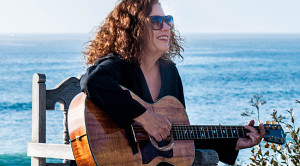Kimm Rogers Goes Where the Pavement Grows

Like the line in the Johnny Cash song, singer-songwriter Kimm Rogers has been everywhere, man. She moved from Cleveland to California and then to Nashville before moving back to California. There, after spending some time busking on the Venice Beach boardwalk, she got a major label deal and put out a handful of acclaimed albums. For her new album, Where the Pavement Grows, she tamed up with multi-instrumentalist Julian Coryell (son of jazz great Larry Coryell). Her nasally vocals are well-suited to mid-tempo rock tune such as “Twenty-Three.” She recently phoned from her Ocean Beach home to talk about the album.
You were born in Cleveland but have said you were destined to live by the ocean and not by the lake. Is that the story?
I lived in Cleveland until I was 10. I went to Thomas Jefferson Elementary School in Euclid. My mom came out to California and that was it for her. She also thought it might be better for my late sister who had a lot of issues with breathing. She came out to California and fell it love with it and we moved. We could take one thing on the plane and Barbie’s Dreamhouse fit under the seat so that was it. We got out to Los Angeles and that was a whole different world.
Is that when you started listening to music?
The whole time I was a kid, I remember music in the house. I got the Supremes “Baby Love” record when I was a kid. I always loved music. Bob Dylan was one of my mom’s favorites. I played violin in elementary school but when I got to California my mom had a guitar. I always was borrowing it and picking things up off the chord books she had around the house. That’s what got me going.
How’d you end up in Venice Beach?
I did a short stint in Nashville. I went there for a short bit. I worked with Roger Cook, who did some demos. I didn’t even do original songs on the demos. He just liked my voice and thought it was unique. He shopped them and then told me to go to New York or L.A. My parents moved to San Diego and I followed suit. I ended up in Venice because I got a waitressing job in Santa Monica. Venice was the logical choice. I had no idea what it was like. I had started a band with Marc Lee Shannon through friends. He played with me often. I also played with Jimmer [Podrasky] from the Rave-ups. We would busk on Venice Beach. I met them through this woman who took on management. I met the band and played some songs for them and low and behold and I go to one of their shows and they did one of my songs. I just about passed out. That set things in motion. I started getting offers from songwriting publishing companies. Sometimes they’d be my backup band but it depended on their availability. They did play on my second record on Island.
Your new album is your first in more than a decade. What the hell have you been doing?
It might even be a couple of decades. Things have changed so much as far as how we make records. It was a remarkable experience. I can’t even tell you how incredibly impressed I am with Julian Coryell, who produced it.
This was at a studio in Venice?
It’s crazy. It was three blocks from where I used to live. It was so profound to walk back to that area. It’s changed so much. It was kind of shocking in a way. I got to see an old friend and it was a wonderful, timely moment. He was diagnosed with lung cancer and I got to see him before he passed. How fortunate that I happened to be in the area at the time.
Talk about the album title, which is also the title track.
We put these concrete parameters around our belief systems that limit us. Here we are in this world we keep building up and building up and it feels like we’re losing our heart and soul. The song came from a poem I started but it can mean more than one thing. To define its meaning is up to the listener but it came from that place of “Why are we making everything so difficult?” The natural world is a place where people tend to feel closer to themselves yet we’re tearing it down. What was weird was when I was thinking about the title of the record a student of mine was going crazy over Shel Silverstein. He had the book Where the Sidewalk Ends. It’s where all the wonder and imagination ends. Where the pavement grows is like being an adult and what the reality is like. We lose that sense of wonder and imagination. We’re more locked in the concrete world.
Are you doing any touring?
I made this record and, in the meantime, my father-in-law was dying. It was very gestalt. I didn’t want to leave home. I didn’t know what to do. To be perfectly honest, I am just learning the ropes again. I feel like Rip Van Winkle. I lost my record deal and slept for a long time and woke up to a new music business world. I’m trying to figure out how to figure out a tour. I hope to do some touring. I love to play live. When you can feel the energy coming off poeple in a room, it’s an incredible feeling.











